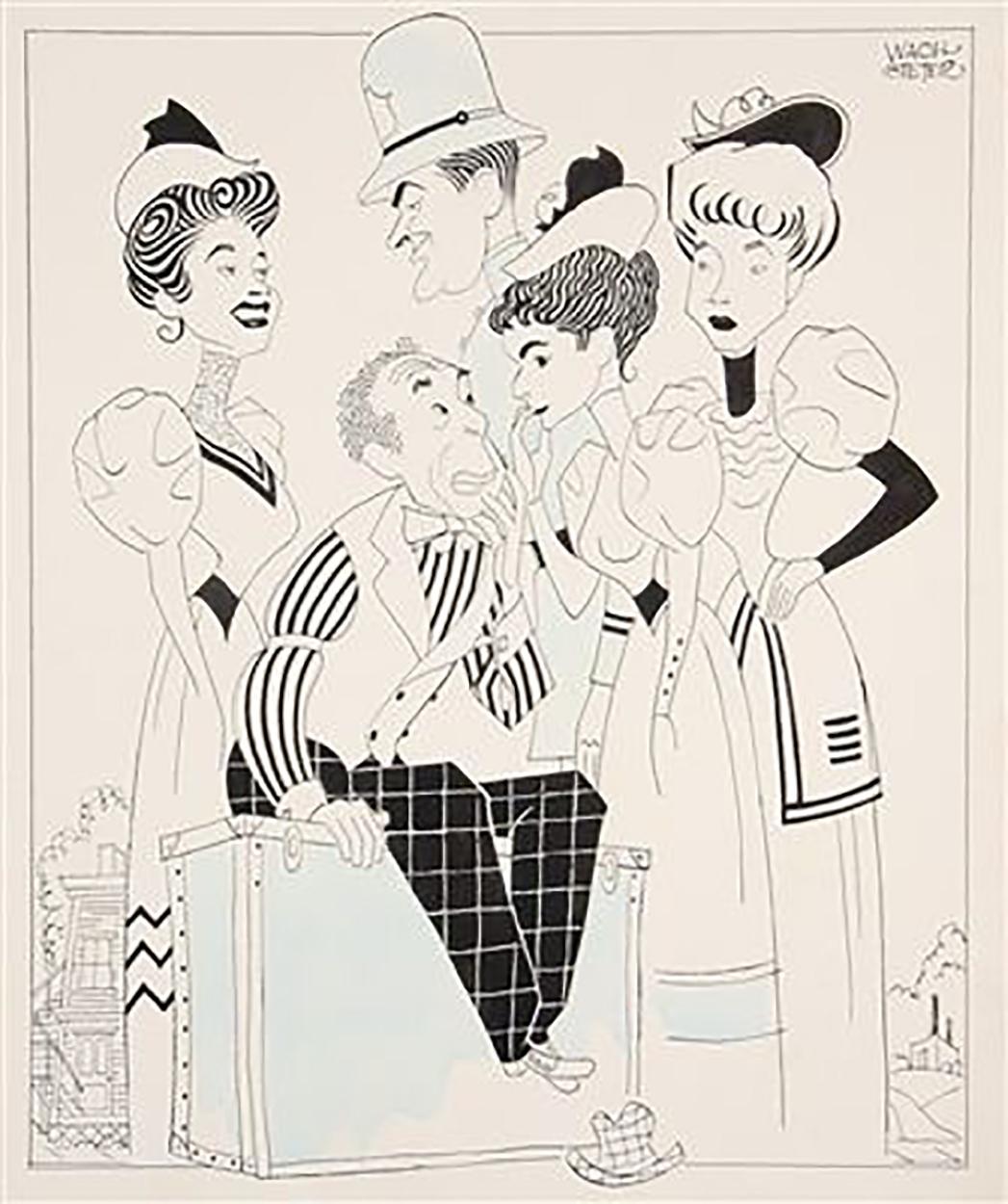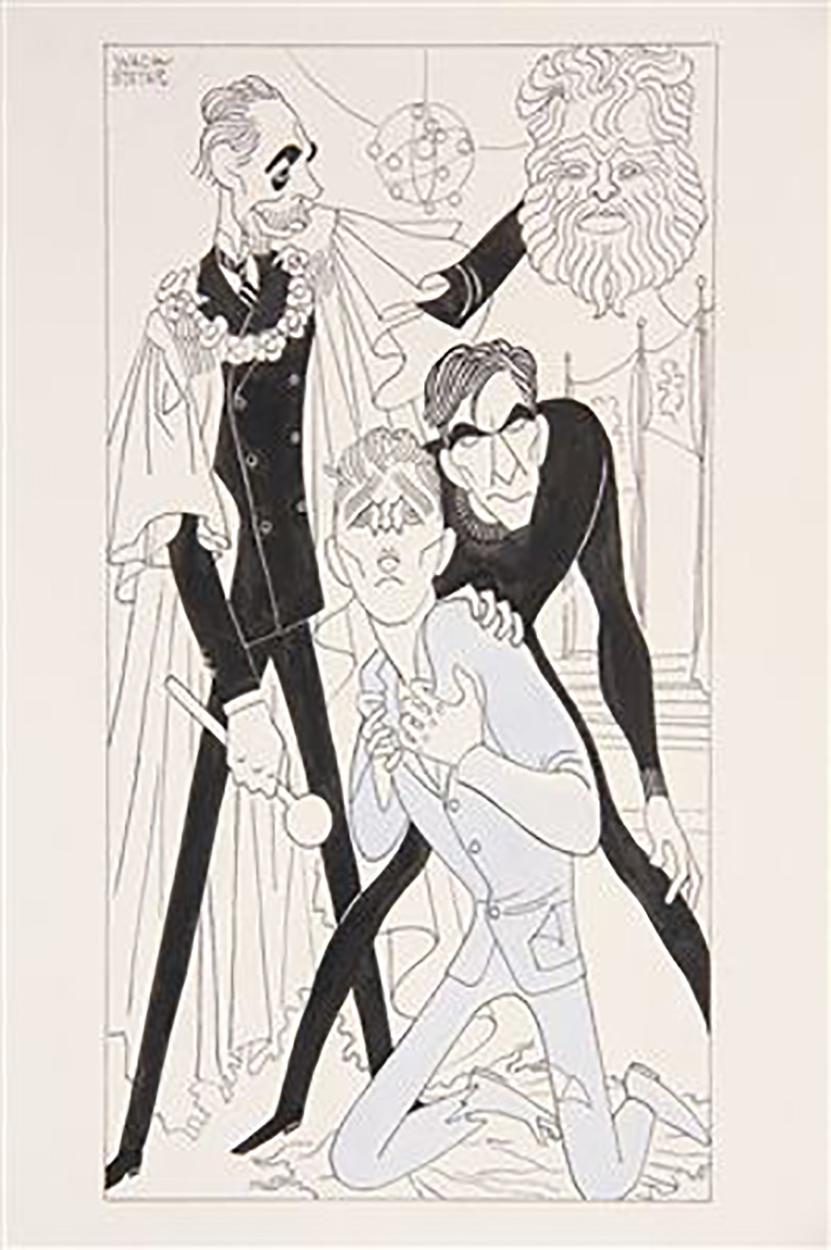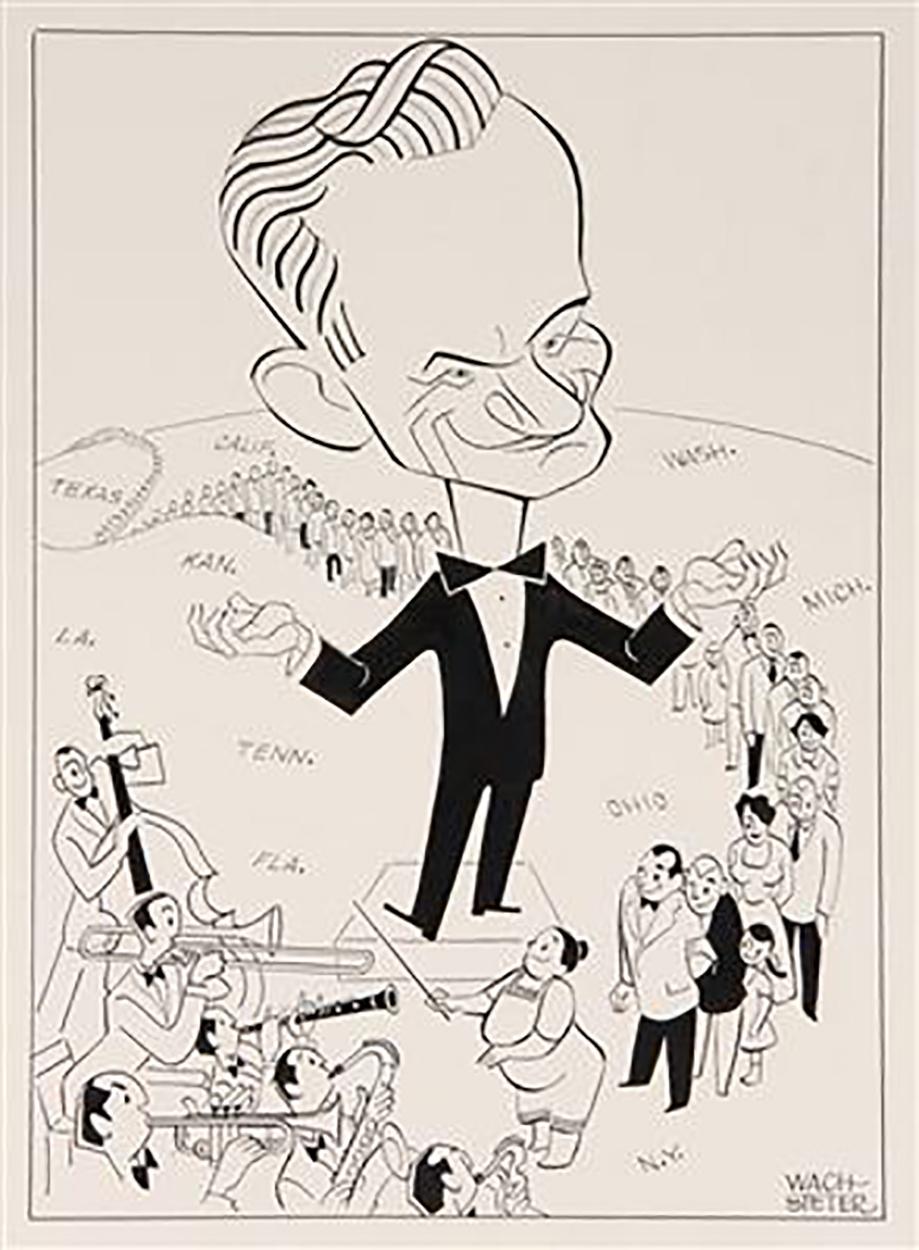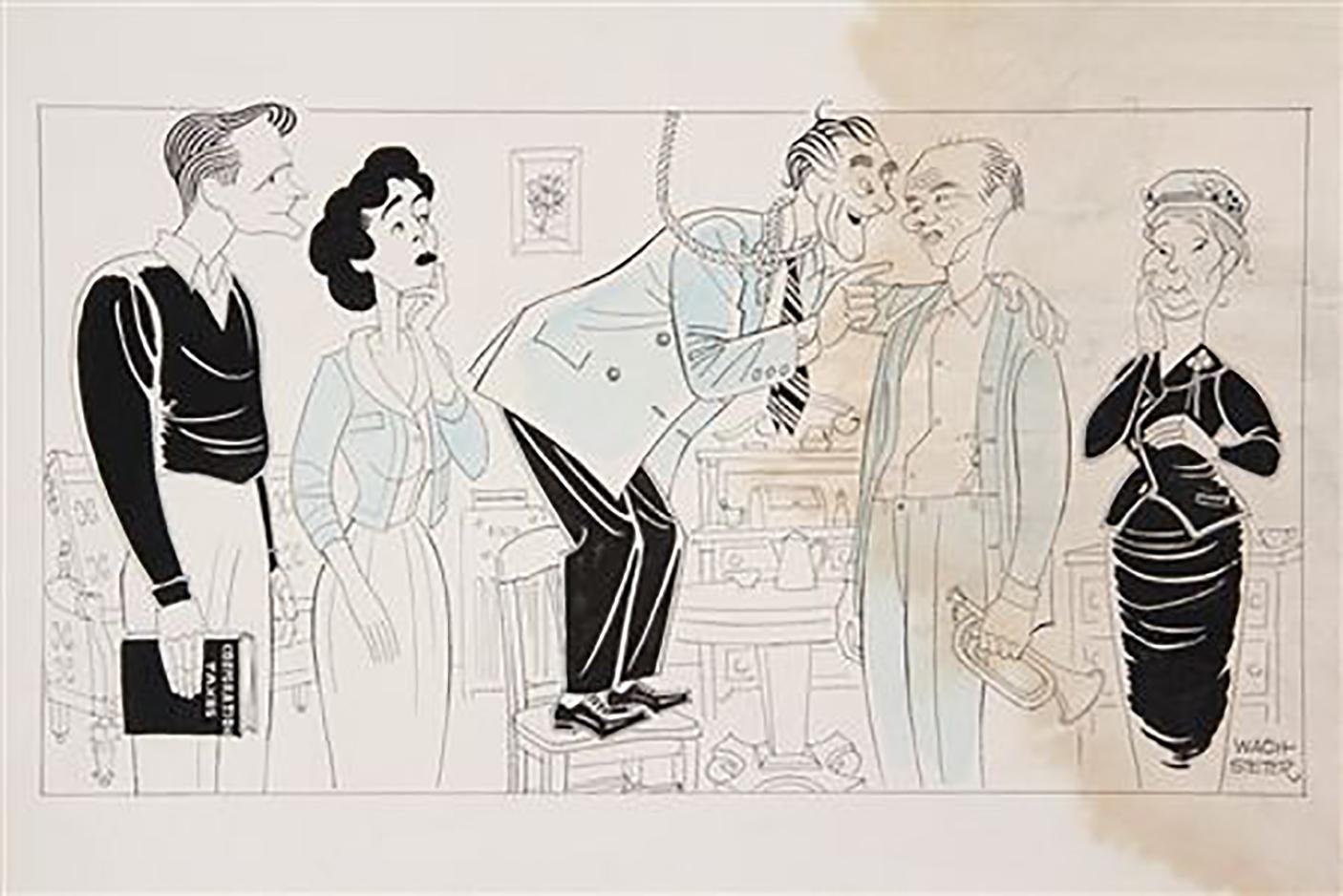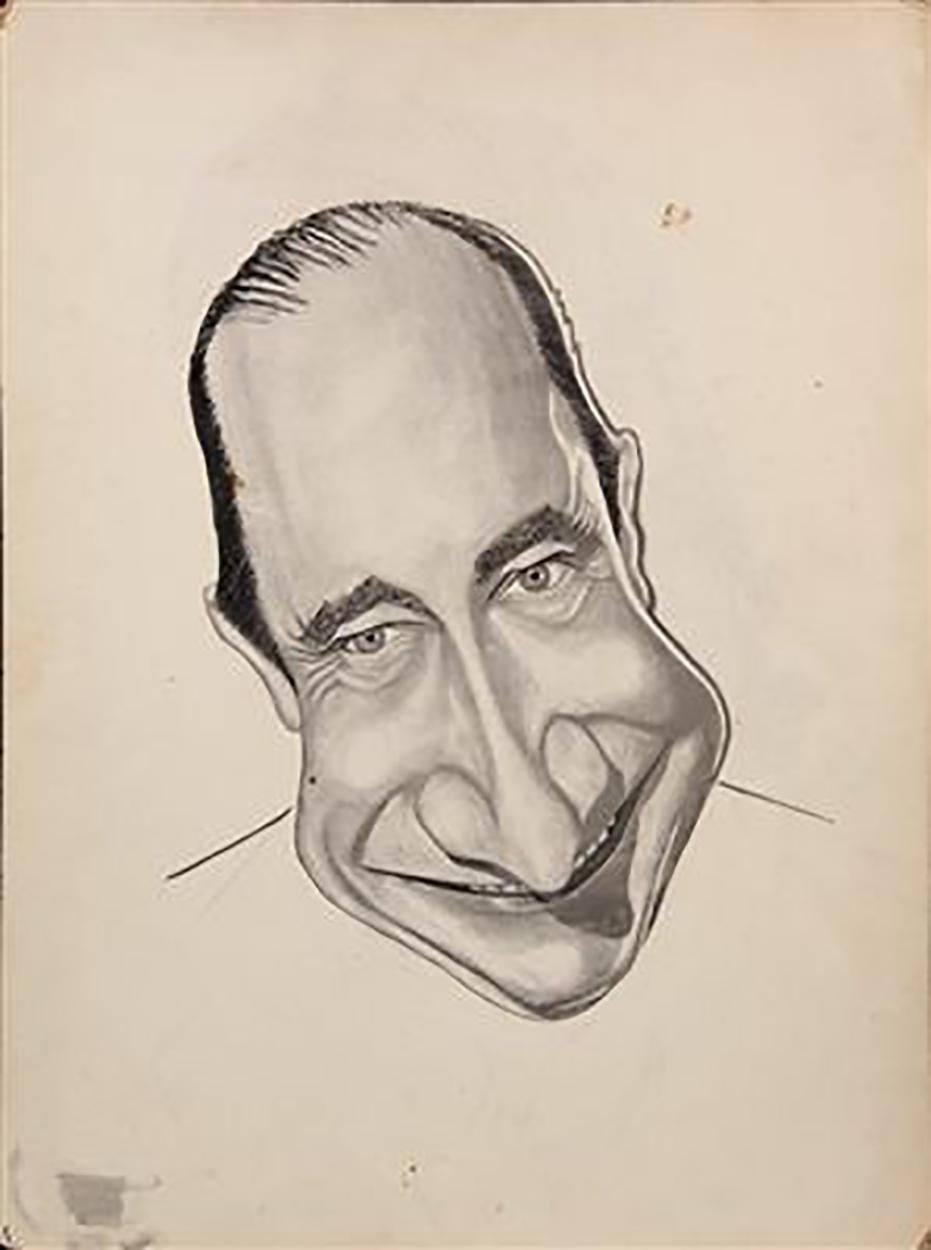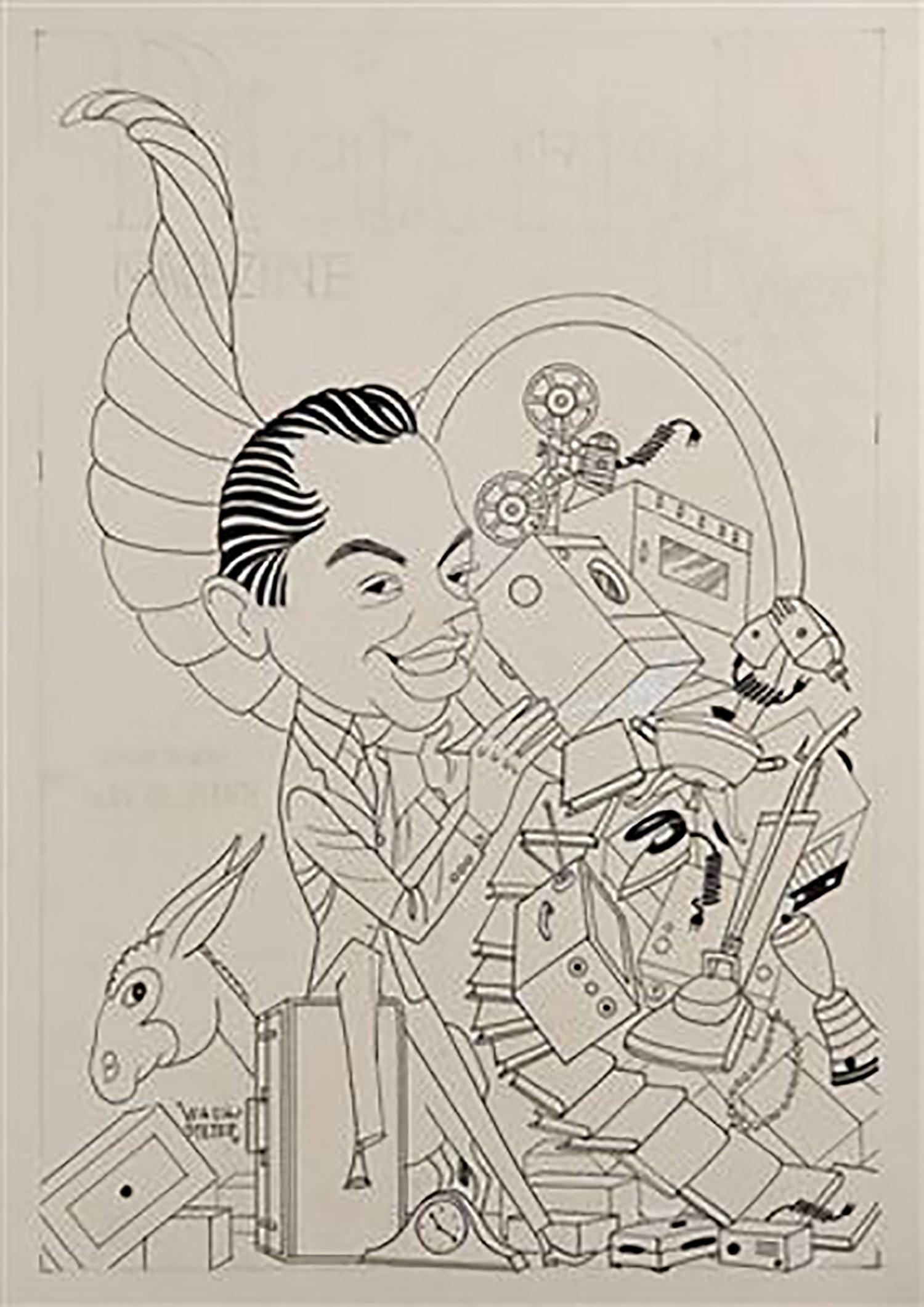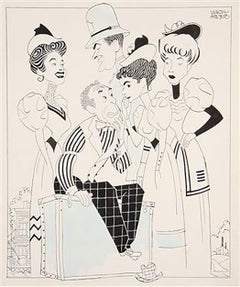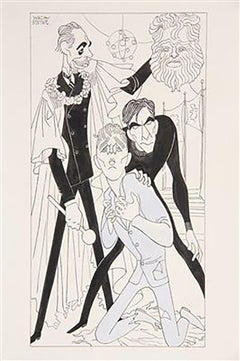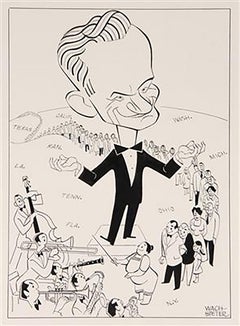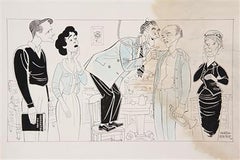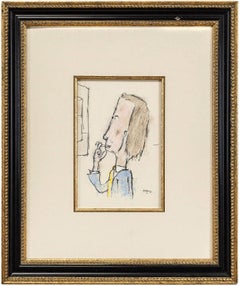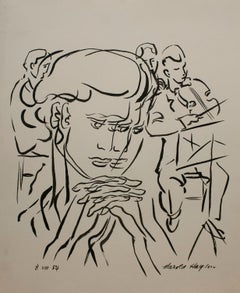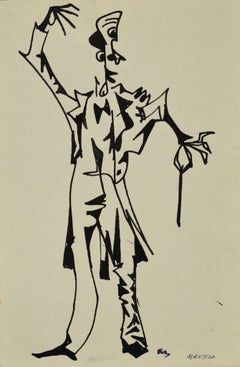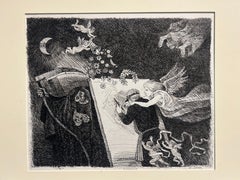Want more images or videos?
Request additional images or videos from the seller
1 of 2
George WachsteterDr. Albert Hibbs on "Exploring"1963
1963
$500
£382.73
€439.31
CA$714.37
A$783.91
CHF 405.88
MX$9,384.08
NOK 5,092.15
SEK 4,790.73
DKK 3,281.44
About the Item
Medium: Pen and Ink on Illustration Board
Signature: Signed Lower Left
Caricature by George Wachsteter (1911-2004) of Dr Albert Hibbs on NBC-TV`s Saturday morning educational program `Exploring`, (1962-1966), featuring the Ritts puppets. Hibbs, a rocket scientist and Director of Space Science at Caltech`s Jet Propulsion Laboratory, was also the voice of Voyager and many other unmanned NAS spacecrafts. For the New York American Journal TView Magazine of April 21, 1963. On 14 1/2" x 22" illustration board. Includes copies of the magazine. 14" x 9 1/2" image. Good condition.
- Creator:George Wachsteter (1911 - 2004)
- Creation Year:1963
- Dimensions:Height: 14 in (35.56 cm)Width: 9.5 in (24.13 cm)
- Medium:
- Period:
- Condition:
- Gallery Location:Fort Washington, PA
- Reference Number:Seller: 23551stDibs: LU38436863512
About the Seller
5.0
Recognized Seller
These prestigious sellers are industry leaders and represent the highest echelon for item quality and design.
Established in 1995
1stDibs seller since 2016
137 sales on 1stDibs
Typical response time: 1 hour
- ShippingRetrieving quote...Shipping from: Fort Washington, PA
- Return Policy
Authenticity Guarantee
In the unlikely event there’s an issue with an item’s authenticity, contact us within 1 year for a full refund. DetailsMoney-Back Guarantee
If your item is not as described, is damaged in transit, or does not arrive, contact us within 7 days for a full refund. Details24-Hour Cancellation
You have a 24-hour grace period in which to reconsider your purchase, with no questions asked.Vetted Professional Sellers
Our world-class sellers must adhere to strict standards for service and quality, maintaining the integrity of our listings.Price-Match Guarantee
If you find that a seller listed the same item for a lower price elsewhere, we’ll match it.Trusted Global Delivery
Our best-in-class carrier network provides specialized shipping options worldwide, including custom delivery.More From This Seller
View All"Uncle Willie"
By George Wachsteter
Located in Fort Washington, PA
Medium: Pen and Ink on Illustration Board
Signature: Signed Upper Right
Caricature by George Wachsteter (1911-2004) for Broadway Comedy, `Uncle Willie` with Menasha Skulnik, Edith F...
Category
1950s Figurative Drawings and Watercolors
Materials
Ink, Illustration Board, Pen
"J. B."
By George Wachsteter
Located in Fort Washington, PA
Medium: Pen and Ink on Illustration Board, with blue to indicate halftone.
Signature: Signed Upper Left
This piece is on 22.00" x 14.00" illustration board, with an image that measures to 12.00" x 6.50."
Caricature by George Wachsteter (1911-2004) for 1958 Broadway drama, `J.B.`, starring Raymond Massey...
Category
1950s Figurative Drawings and Watercolors
Materials
Ink, Illustration Board, Pen
Sammy Kaye for "So You Want to Lead a Band"
By George Wachsteter
Located in Fort Washington, PA
Medium: Pen and Ink on Illustration Board
Signature: Signed Lower Right
On 20.00" x 15.00" illustration board, the image measuring to 13.00" x 9.00."
Caricature by George Wachsteter (1911-2004) of `Swing-and-Sway` orchestra leader Sammy Kaye for his CBS-TV audience participation variety show, `So You...
Category
1950s Figurative Drawings and Watercolors
Materials
Ink, Illustration Board, Pen
"The Greatest Man Alive!"
By George Wachsteter
Located in Fort Washington, PA
Medium: Pen and Ink on Illustration Board
Signature: Signed Lower Right
Caricature by George Wachsteter (1911-2004) for 1957 Broadway comedy, `The Greatest...
Category
1950s Figurative Drawings and Watercolors
Materials
Ink, Illustration Board, Pen
Eric Blore
By George Wachsteter
Located in Fort Washington, PA
Medium: Charcoal on Illustration Board
Signature: Unsigned
Caricature by George Wachsteter (1911-2004) of 1930s English character actor Eric Blore, best known for his film roles in ...
Category
1930s Figurative Drawings and Watercolors
Materials
Charcoal, Illustration Board
Hugh Downs on "Concentration"
By George Wachsteter
Located in Fort Washington, PA
Medium: Pen and Ink on Board
Signature: Signed Lower Left
Date: Aug. 27, 1961
Caricature by George Wachsteter (1911-2004) of Hugh Downs surrounded by a cornucopia of prizes as emcee of the long-running NBC daytime game show...
Category
1960s Portrait Drawings and Watercolors
Materials
Ink, Illustration Board, Pen
You May Also Like
The Connoisseur
By William Anthony
Located in Surfside, FL
William Anthony
Born 1934, Forth Monmouth, NJ. and grew up in Washington State.
Education
1958 Yale, New Haven, CT, B.A European History
1959-60 San Francisco Art Institute, CA
1961...
Category
Late 20th Century Contemporary Figurative Drawings and Watercolors
Materials
Paper, Pastel, Pencil
A Fine 1950s, Surrealist Depiction of a Summer Symphony
By Harold Haydon
Located in Chicago, IL
A 1954 Surrealist depiction of a Summer symphony by artist Harold Haydon.
Images size: 16 1/2" x 14. Unframed, mounted / floated to a custom Holly Hunt designed gray toned wallpap...
Category
1950s American Modern Portrait Drawings and Watercolors
Materials
Paper, Ink
Maestro
By Ron Blumberg
Located in West Hollywood, CA
American artist Ron Blumberg was classically trained at La Grande Academie Chaumiere in Paris, 1932, before moving to New York where he became a National Academy artist and a member of the Art Students League.
"Maestro", is a rare pen...
Category
1950s Figurative Drawings and Watercolors
Price Upon Request
Inspiration
Located in Toronto, ON
25.5 x 23" Unframed
Original Pen and Ink Sketch
Hand Signed by Joe Lasker
Category
21st Century and Contemporary Figurative Drawings and Watercolors
Materials
Watercolor
$1,400
The Painter - Drawing by Mino Maccari - 1935 ca.
By Mino Maccari
Located in Roma, IT
Watercolor on paper realized by Mino Maccari in 1935 ca.
Hand signed in pencil lower right.
Very good condition except for some very minor defect in the edges.
Category
1930s Modern Figurative Drawings and Watercolors
Materials
Charcoal, Watercolor
$1,243 Sale Price
25% Off
Art Lovers and Art Critics Analyzing Obscene Painting. Cartoon
By Richard Taylor
Located in Miami, FL
Cartoonist Richard Taylor was trained in academic art. He frequently comments on abstract art which was the new and radical thing at the time. "Curtis sees so much more in these thi...
Category
1940s Academic Portrait Drawings and Watercolors
Materials
Ink, Board
